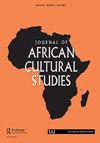非洲研究与中非合作:走向“共同利益”
IF 0.7
2区 社会学
Q2 CULTURAL STUDIES
引用次数: 0
摘要
这是2018年11月16日上午。我刚刚结束了与北京大学非洲研究中心教员,特别是亚非语言与文化系的一次互动。我想,那是我被称为“巡回演讲”的一周访问的第六天。尽管会议是正式的,但我的演讲,其核心内容我已记不清全文,一方面是对中非之间可能的学术合作领域的思考和反思,另一方面是对北京大学和我自己的大学奥孙州立大学的思考和反思。(也许,由于北京和拉各斯之间有7个小时的时差,我对北京一些事件的时间线有一个模糊和不准确的回忆。)讨论由英成(Ying Cheng)主持,他担任翻译(我用英语发言),既生动又引人入胜。我与全体教员的会面是安排给我的三个主要活动中的第一个。第二场演讲的听众包括学者和研究生,题目是“音乐是未来的武器:Fela Anikulapo-Kuti的反叛艺术、尼日利亚流行音乐与意识形态重整的逻辑”。第三项活动是“非洲文化周”,在我访问期间组织了一系列舞蹈、音乐和歌唱表演,旨在将在北京大学和中国其他大学学习的非洲和非洲主义学生,以及在中国的尼日利亚和更大的非洲社区成员聚集在一起。参加我的第一次演讲的是来自中国其他大学的学者,除了我之外,听众中至少还有另外两位外国人(来自南非的表演诗人Natalia Molebatsi和一位美国白人游客)。演讲结束后,中心主任、杰出的非洲历史学者(李2000)和中非关系学者,以及中国最杰出的非洲学家李鞍山教授赠送给我一份《中国非洲研究年鉴》(2016),这是我自己的学术背景——非洲文学的特刊。李教授在《年度评论》的复印件上签上了他自己的笔迹(为了我的利益,用英文写的):“为了我们的共同利益”。他的话将作为我在这次圆桌会议上思考的切入点。这些都是精心挑选的乐观话语,出自长相显赫的鞍山教授之口,表明了非洲研究可以(甚至应该)在中非合作中发挥的作用。非洲研究是相对较新的本文章由计算机程序翻译,如有差异,请以英文原文为准。
African Studies and Sino-Africa Collaborations: Towards Our “Common Interest”
It was the morning of 16 November 2018. I had just finished an interactive session with the Faculty of the Centre of African Studies, specifically, the Department of Asian and African Languages and Culture, Peking University (PKU). It was, I think, the sixth day of my one week visit that was dubbed a “lecture tour”. Even though the meeting was formal, my talk, whose core focus I can no longer recall in its entirety, consisted of thoughts and reflections on possible areas of academic collaboration between China and Africa on the one hand, and the University of Peking and my own university, Osun State University, on the other hand. (Perhaps, due to the seven-hour time difference between Beijing and Lagos, I have a blurry and inaccurate recollection of the timeline of some of the events in Beijing.) The discussion, moderated by Ying Cheng, who served as the translator (as I spoke in English), was both animated and engaging. My meeting with the faculty was the first of the three main events lined up for me. The second was a talk delivered to a mixed audience of academics and graduate students entitled “Music is the Weapon of the Future: Fela Anikulapo-Kuti’s Rebel Art, Popular Music in Nigeria and the Logic of Ideological Reconditioning”. The third event was an “African Culture Week”, a series of performances – dance, music and singing organised to coincide with my visit, and which aimed to bring together African and Africanist students studying in PKU and other universities in China as well as members of the Nigerian and larger African communities in China. Attending my first presentation were academics from other universities in China, and at least two other foreigners apart from me (Natalia Molebatsi, a performance poet from South Africa and a white American visitor) in the audience. After my talk, the Director of the Centre, distinguished scholar of African history (Li 2000) and Africa–China relations, and the most distinguished Africanist in China, Professor Li Anshan, gifted me a copy of the Annual Review of African Studies in China (2016) which was a Special Issue on African Literature, my own academic background. Professor Li signed the copy of the Annual Review with the following words in his own writing (in English for my benefit): “For our common interest”. His words will serve as an entry point for my reflections in this roundtable. They are carefully chosen and optimistic words from the distinguishedlooking Professor Anshan that gesture at the kind of role that African Studies could (and even should) play in Sino-Africa collaborations. African Studies is relatively new in
求助全文
通过发布文献求助,成功后即可免费获取论文全文。
去求助
来源期刊

Journal of African Cultural Studies
Multiple-
CiteScore
1.70
自引率
10.00%
发文量
13
期刊介绍:
The Journal of African Cultural Studies publishes leading scholarship on African culture from inside and outside Africa, with a special commitment to Africa-based authors and to African languages. Our editorial policy encourages an interdisciplinary approach, involving humanities, including environmental humanities. The journal focuses on dimensions of African culture, performance arts, visual arts, music, cinema, the role of the media, the relationship between culture and power, as well as issues within such fields as popular culture in Africa, sociolinguistic topics of cultural interest, and culture and gender. We welcome in particular articles that show evidence of understanding life on the ground, and that demonstrate local knowledge and linguistic competence. We do not publish articles that offer mostly textual analyses of cultural products like novels and films, nor articles that are mostly historical or those based primarily on secondary (such as digital and library) sources. The journal has evolved from the journal African Languages and Cultures, founded in 1988 in the Department of the Languages and Cultures of Africa at the School of Oriental and African Studies, London. From 2019, it is published in association with the International African Institute, London. Journal of African Cultural Studies publishes original research articles. The journal also publishes an occasional Contemporary Conversations section, in which authors respond to current issues. The section has included reviews, interviews and invited response or position papers. We welcome proposals for future Contemporary Conversations themes.
 求助内容:
求助内容: 应助结果提醒方式:
应助结果提醒方式:


